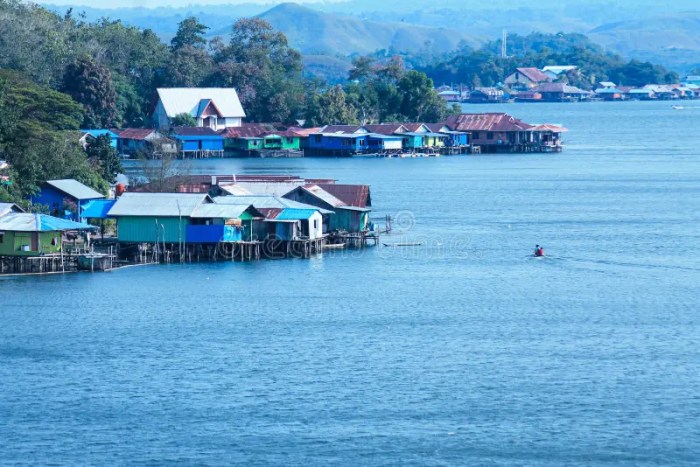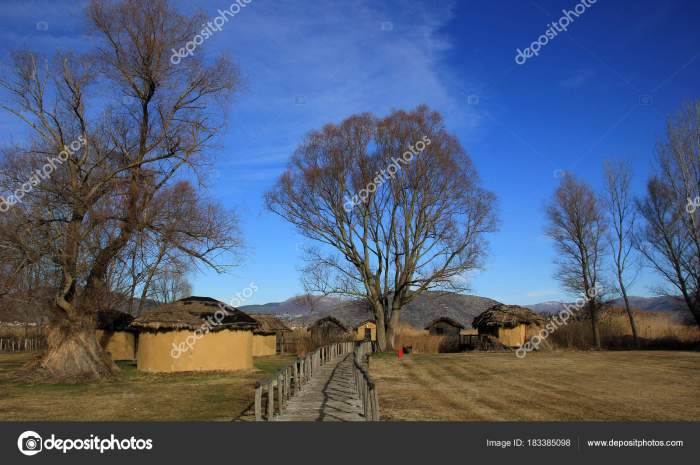Helvetian peoples settlement on a lake – The Helvetian peoples’ settlement on a lake stands as a testament to their ingenuity and adaptability. This fascinating settlement, nestled amidst the serene waters and picturesque surroundings, offers a glimpse into their unique culture, social practices, and economic activities.
The geographical features of the lake and its surroundings played a pivotal role in shaping the Helvetian settlement. The lake provided a source of sustenance, transportation, and defense, while the surrounding terrain offered natural resources and protection.
Origins and Background

The Helvetian peoples, a Celtic tribe, originated in the area that is now Switzerland and southern Germany. They were a skilled and resourceful people who developed a unique culture and society. Around the 1st century BCE, the Helvetians began to migrate from their homeland in search of new lands.
They eventually settled on a lake in the Jura Mountains, which provided them with a defensible and strategic location.
Reasons for Settlement on a Lake
- Defense:Lakes provided a natural barrier against enemy attacks, making them ideal for settlement.
- Transportation:Lakes served as convenient waterways for transportation and trade.
- Food:Lakes were rich in fish and other aquatic resources, providing a reliable food source.
- Resources:The surrounding areas of lakes offered access to wood, water, and other essential resources.
Geographical Considerations: Helvetian Peoples Settlement On A Lake

The lake chosen by the Helvetians was located in the Jura Mountains, a region characterized by steep slopes and dense forests. The lake itself was relatively large, providing ample space for the settlement. The surrounding area was also rich in natural resources, such as wood, water, and fertile soil.
Influence on Helvetian Settlement
- Defense:The steep slopes and dense forests provided natural defenses against invaders.
- Transportation:The lake and its tributaries allowed for easy movement of goods and people.
- Resources:The surrounding forests and mountains provided access to essential resources for building and sustenance.
- Agriculture:The fertile soil in the area allowed the Helvetians to cultivate crops and raise livestock.
Cultural and Social Practices

The Helvetians were a communal people who lived in extended family groups. They practiced a polytheistic religion and believed in the importance of ancestor worship. Their social structure was hierarchical, with a ruling elite and a class of commoners.
Influence on Lake Settlement, Helvetian peoples settlement on a lake
- Community:The communal nature of Helvetian society fostered cooperation and shared responsibilities within the settlement.
- Religion:The lake and its surroundings may have held religious significance, as evidenced by the presence of sacred sites and offerings.
- Social Hierarchy:The ruling elite likely occupied the most desirable locations within the settlement, while commoners lived in more modest dwellings.
- Trade:The settlement’s location on a lake and near trade routes facilitated social and economic interactions with other communities.
Economic Activities

The Helvetians were primarily farmers and herders. They cultivated crops such as wheat, barley, and rye, and raised livestock such as cattle, pigs, and sheep. They also engaged in fishing and hunting, and traded with neighboring communities for goods such as salt and metal tools.
Adaptation to Lake Settlement
- Fishing:The lake provided a rich source of fish, which became a staple food for the Helvetians.
- Agriculture:The fertile soil around the lake allowed for successful crop cultivation.
- Trade:The lake and its tributaries facilitated the transportation of goods and fostered trade with other communities.
- Resource Utilization:The Helvetians utilized the lake’s resources, such as reeds and timber, for building and crafting.
Questions Often Asked
What were the origins of the Helvetian peoples?
The Helvetian peoples originated from the Celtic tribes that inhabited Central Europe during the Iron Age.
Why did the Helvetian peoples settle on a lake?
The lake provided a source of sustenance, transportation, and defense, while the surrounding terrain offered natural resources and protection.
What were the key cultural practices of the Helvetian peoples?
The Helvetian peoples had a rich cultural heritage, including religious practices, social customs, and artistic traditions.
What economic activities did the Helvetian peoples pursue?
The Helvetian peoples engaged in a variety of economic activities, including agriculture, fishing, hunting, and trading.
What architectural innovations did the Helvetian peoples employ?
The Helvetian peoples developed innovative architectural techniques, including the use of pile dwellings and wooden platforms.